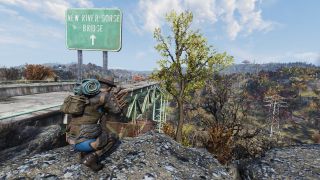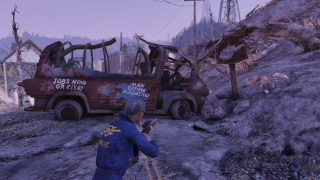Media
Fallout on Amazon: Why Is the Wasteland So Wonderful?
The Fallout TV show is driving interest in video games and their digital worlds.
Posted April 27, 2024 Reviewed by Lybi Ma
Key points
- Amazon Prime's Fallout series has ignited interest in the longstanding video game series.
- As video games become more commonplace, gaming content is increasing popular.
- The show, and the game, are another example of how entertainment fans engage content across media.
- Especially important for Fallout is the sense of place the game, and the show, create for their audiences.

In April 2024, Amazon Prime subscribers were given access to one of the most elusive and confounding places imaginable, the survival vaults and pock-marked surface of a post-nuclear war United States. The show was the most popular streaming television program when it was released, and it follows a recent run of video game-based television programs, with some wondering if we've reached a point where video game content can be considered "prestige television" (Barasch, 2022).
Among the many reasons for the show's success: For most gamers, we formed personal connections with the places in "Fallout" through the franchise's nearly 40 years, and this sense of place is a powerful reminder of our past in-game experiences.
Sense of Place, Defined
In the mid-20th century, cultural geographer Yi-Fu Tuan (段義孚) argued for a humanistic geography focused less on labels and numbers, and more on people's experiences in places. Among the more enduring notions from this perspective was a sense of place, or the personal connection(s) that people form with the physical places they engage and inhabit. For Tuan (1975, p. 152):
“to know a place fully means both to understand it in an abstract way and to know it as one person knows another”
Places can be symbolic of important experiences or artifacts in our lives, and places serve a purpose for us. Sense of place is especially strong when we think of social relationships we have formed in different locations, and when we can recall important life events tied to those places. Finally, we tend to have strong emotional attachments to places. All of this feeds into a genius loci —a spirit of place (Norberg-Schulz, 1989)— that we attach to places. Although we occupy different spaces throughout life, we attach to few places.
Sense of Place in a (Digital) Appalachia
Much of the early focus was on physical locations. However, consider that video games have been providing their players the possibility to live and thrive in digital places for nearly 60 years. From enduring properties such as "Super Mario Bros." to persistent online worlds found in massively multiplayer games like "World of Warcraft," gamers have spent as much time in digital spaces as in physical ones. We (Banks and Bowman, 2024) found that many of the same themes for sense of place in physical places apply to digital ones—including places that do not have any visual rendering of a "world" per se, such as social media platforms.

Connecting this all back to "Fallout," one of our research teams looked into the possibility of experiences in video games to foster a sense of place in their players. The game "Fallout 76" was chosen for a few reasons, such as the franchise's overall popularity (nearly 12 million units as of 2020, not including "Fallout 76") and the franchise's history of featuring real-world locations such as Las Vegas, Boston, and many places in between.
"Fallout 76" was unique because the game was located in West Virginia, one of the smallest US states and the only one located, entirely, in the Appalachian Mountains. Between the state's small population, remote location, mostly disparaged reputation (Bowman and Groskopf, 2010), and being the backdrop for a major video game franchise's much-anticipated release, our research team—at the time, all based at West Virginia University—was eager to see how players might engage with the game and by extension, West Virginia itself. Cultural commentators shared this sentiment was shared; even the West Virginia governor's office was promoting the game's connection to The Mountain State.
Playing Fosters a Sense of Place

In a study published with Technology, Mind, and Behavior, our team found that as expected, a sizable number of "Fallout 76" players had no prior experience with or strong feelings towards West Virginia. This provided a natural experiment, as we directly compared their sense of place between players with West Virginia roots. As might be expected, native West Virginians scored significantly higher on a sense of place, but that gap in scores closed after only two weeks of playtime. Six weeks after that? Their initial boost in the sense of place scores for West Virginia "newbies" remained high, but only for those still playing the game.
The game developers engaged Appalachia as a geographic space with tall mountains, deep ravines, and dark coal mines. They also imbued the digital world with the culture of Appalachia: cryptozoological creatures and local lore, bluegrass music, mountain vistas, and even representations of labor strife between miners, energy companies, and the government. In open-ended responses and shared in-game photos with us—and even in unsolicited communication with the research team—players talked about learning more about West Virginia, buying WV-themed clothing, and even planning road trips to the state. It became clear that after two months in a digitized (albeit war-torn) Appalachia, they had a sense of place in West Virginia.
We have seen similar effects in other studies (Bowman and Robinson, 2021) finding that players revisiting "World of Warcraft" were motivated by a sense of place in the online world, wanting to return to nostalgic experiences that somewhat resembled a "homecoming." Another study (Bowman and colleagues 2023) found that games in the "Assassin's Creed" franchise—which prides itself on intricate portrayals of ancient and modern history—can foster a sense of place and a desire to visit those locations.
All of this is to say that as we increasingly move between physical and digital locations, we should more deeply embrace and appreciate the sense of place we develop for each. These findings are just a few that speak to the increasingly authentic and meaningful role that digital places play in our daily lives.
The television show is far less stressful than scavenging for the goods necessary to create my own stimpaks.
References
Banks, J. & Bowman, N. D. (2024). Murmuring crowds and flickering lights: Exploring sense of place across spatial materialities and valences. Proceedings of 57th Hawaii International Conference on Social Systems. Retrieved from https://hdl.handle.net/10125/106705
Barasch, A. (2022, December 26). Can a video game be prestige TV? The New Yorker. Retrieved from https://www.newyorker.com/magazine/2023/01/02/can-the-last-of-us-break-the-curse-of-bad-video-game-adaptations
Bowman, N. D., Banks, J., & Rittenour, C. (2020). Country Roads through 1s and 0s: Sense of place for and recollection of West Virginia following long-term engagement with Fallout 76. Technology, Mind, & Behavior, 1(1), https://doi.org/10.1037/tmb0000001
Bowman, N. D. & Groskopf, J. (2010> Appalachia: Where the Squids hate the Chalkies. KB Journal, 7(1). https://kbjournal.org/bowman_groskopf
Bowman, N. D., Vandewalle, A., Daneels, R., Lee, Y., & Chen, S. (2023). Animating a plausible past: Perceived realism and sense of place influence entertainment of and tourism intentions from historical video games. Games & Culture, 19(3). https://doi.org/10.1177/15554120231162428
Norberg-Schulz, C. (1980). Genius loci: Towards a phenomenology of architecture. Rizzoli.
Robinson, J. A. & Bowman, N. D. (2021). Returning to Azeroth: Nostalgia, sense of place, and social presence in World of Warcraft Classic. Games & Culture, 17(3). https://doi.org/10.1177/15554120211034759
Tuan, Y.-F. (1975). Place: An experiential perspective. Geographical Review, 65(2), 151–165. https://doi.org/10.2307/213970




